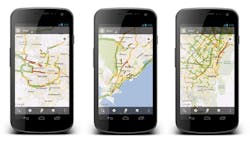Google Merges Online and Offline Worlds in Maps
Google has taken another step in its quest to merge the Internet with the real world with Maps -- and put itself at the heart of mobile gadget lifestyles in the process.
The California technology titan added Poland and the Ukraine to the list of more than 200 countries and regions where people can correct, update or enhance Google Maps with local insights or expertise.
"Google has been about searching the online world, but most people live in the offline world, the physical world," Google Earth and Maps vice president Brian McClendon told AFP.
"We want to be able to provide a map wherever you are going; a way to have the best answers for what is within walking distance and transmit them in a fast, interactive way."
Google began tapping into collective knowledge for cartography in 2008 with the launch of a Map Maker tool in India, where details regarding streets in cities was meager to non-existent.
"There were some places in the world where, even in big cities, the map was essentially a blank canvas," said Map Maker product manager James Kelly.
"We have taken the tool from just adding roads to adding all kinds of features like speed limits and suitability for bicycles," he continued. "We also made it possible to add businesses and other points of interest."
The tool allows people to update Google Maps to show local features ranging from bicycle paths and foot trails to parking lots or playgrounds.
Verified or trusted editing changes go live in minutes and spread across the more than 800,000 websites that embed Google Maps.
"We started Map Maker for the developing world and have been ramping it up," McClendon said. "We definitely want Map Maker to reach everyone in the world."
Global Mappers
A global community of thousands of volunteer mappers review and approve each other's edits.
When needed, additional data used to corroborate suggested edits include satellite imagery, public feedback, and information collected by Street View vehicles that capture pictures to provide views of locations in maps.
Politically set borders can't be edited.
Having the preferred online mapping service is seen as a key strategic asset for Google as people rely increasingly on smartphones or tablet computers for directions, restaurant recommendations and other information on the go.
Position-sensing features in smartphones present opportunities to advertise local shops or events.
McClendon believed that how well mapping software helps people find what they seek in the real world is so important it could be a reason to choose one smartphone over another, perhaps an Android handset instead of an iPhone.
"People's first computing experience is in their pocket," McClendon said, referring to the shift to accessing the Internet with smartphones.
"It turns out a lot of the world's information is geographic," he continued. "Trust in getting the answers right and being able to travel with an accurate map of the world is a powerful differentiator."
The Apple Divide
Apple (IW 500/9) in June announced that it was booting Google Maps from iOS software powering Apple iPhones, iPads, and iPod Touch devices and replacing it with a custom-made mapping service.
"Location-based services, maps, are a key strategic asset in the mobile services arena," NPD analyst Ross Rubin told AFP at the time.
Delivering iPhone services based on locations, and in the context of what users might be doing at the time, was a major theme during the presentation that kicked off Apple's annual Worldwide Developers Conference this year.
Siri personal assistant software in iPhones will find nearby restaurants or movie theaters, weaving in reviews from customer-feedback websites Yelp or Rotten Tomatoes and even letting people buy film tickets from Fandango.
-- Glenn Chapman, AFP
Copyright Agence France-Presse, 2012
About the Author
Agence France-Presse
Copyright Agence France-Presse, 2002-2025. AFP text, photos, graphics and logos shall not be reproduced, published, broadcast, rewritten for broadcast or publication or redistributed directly or indirectly in any medium. AFP shall not be held liable for any delays, inaccuracies, errors or omissions in any AFP content, or for any actions taken in consequence.
